Good genes? The sisters who put the rest of us to shame
- Published
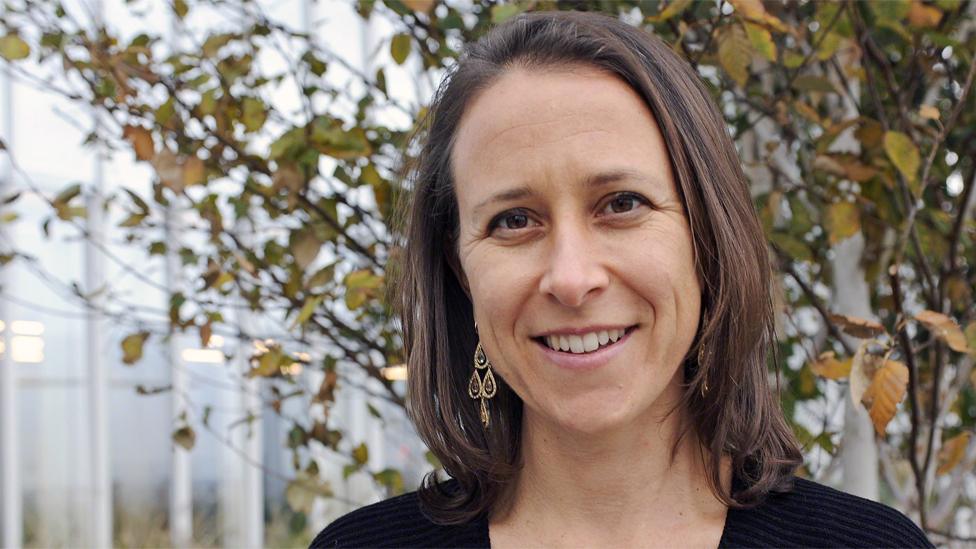
Anne Wojcicki co-founded 23andMe in 2006
The BBC's weekly The Boss series profiles a different business leader from around the world. This week we speak to Anne Wojcicki, founder of genetic testing business 23andMe.
If you ever worry that you and your siblings are not achieving enough in life, Anne Wojcicki and her two sisters won't make you feel any better.
Anne, 45, is the chief executive of Silicon Valley-based 23andMe, which is valued as high as $2.5bn (£2bn),, external while Susan Wojcicki, 50, is the chief executive of YouTube.
Third sister Janet Wojcicki, 48, is an associate professor of epidemiology at the University of California, San Francisco, where she helps lead efforts to tackle everything from obesity to HIV.
Not bad genes in that family you would guess, but Anne says their individual achievements are down to a combination of luck and good parenting.
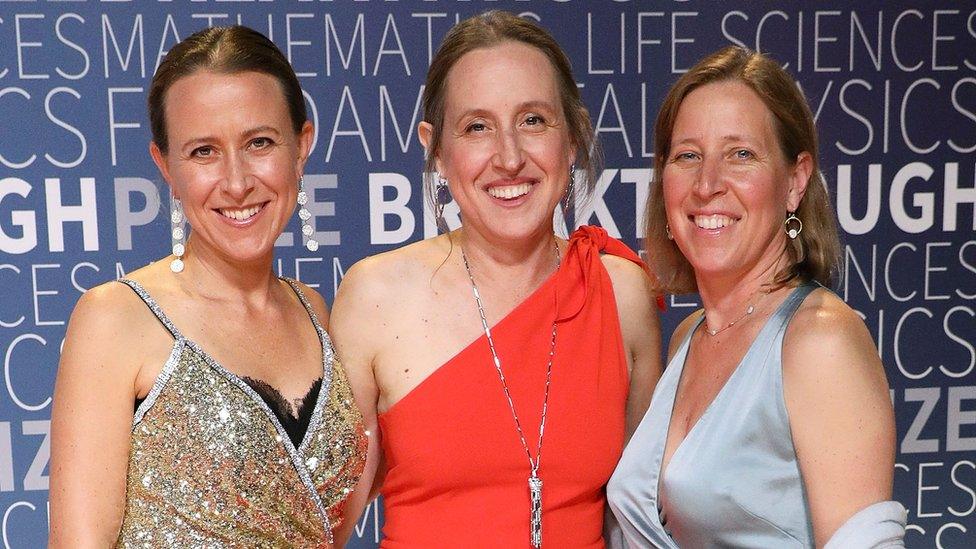
Anne (left), Janet (centre) and Susan were brought up on the campus of Stanford University where their father was a physics professor
"We were lucky to be raised by great parents who exposed us both to communication - my mum is a journalist - and technology - my dad is a particle physicist," she says.
She recalls that her parents taught them all to be free thinkers. "I remember them telling me, 'Don't be afraid if someone disagrees with you.'"
But if Anne believes that her upbringing was a bigger contributor to her success in life than her genetic makeup, since 2006 she has been leading a company that tests people's genes - 23andMe.
Named after the number of chromosomes in a normal human cell, the company allows members of the public to receive data about their ancestry, and - more controversially - gain information on their genetic health risks. They do this by posting off a 23andMe home saliva testing kit.
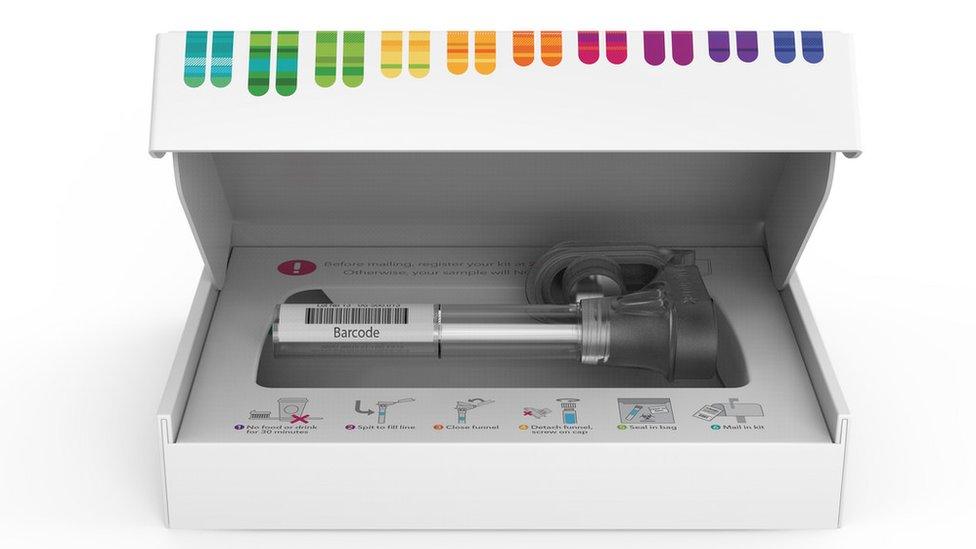
Users of 23andMe send off a sample of their saliva
After growing up on the campus of Stanford University, near San Francisco, where her father was a professor, Anne crossed the US to study at Yale University in Connecticut.
After graduating with a biology degree in 1996 she moved back to California to work as a molecular biology researcher at the National Institutes of Health government agency, and then the University of California, San Diego.
The idea for 23andMe came when she realised that the insurance-based US healthcare system did not put enough focus on preventing illnesses in the first place, or the poorest members of society.
"I started to see how financial incentives encouraged the healthcare system to not really care for the patients that needed their help the most," says Anne.
After all, she adds, healthcare professionals "don't make money by preaching prevention, and so I wanted to create something in the best interest of everyday people".
She says she was further motivated by the rise of Facebook, other forms of social media, and YouTube, which she says gave members of the public much more of a voice.
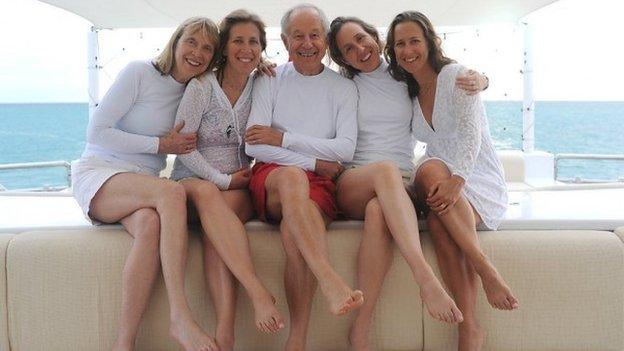
Anne Wojcicki says her parents have very different personalities
So in 2006 she set up 23andMe with co-founders Linda Avey and Paul Cusenza.
The test enabling people to find out more about their ancestry - such as where around the world a person's DNA comes from - was instantly popular, but the company has faced difficulty with its parallel health risks test service.
Specifically, 23andMe struggled to get regulatory approval for its health tests, due to concerns about their accuracy.
This led to a number of run-ins with the US Food and Drug Administration (FDA), which in 2013 banned the company from marketing them.
The FDA started to give approval for 23andMe's health checks from 2015, and it can now offer them on everything from risk of certain cancers, Alzheimer's, Parkinson's, and coeliac disease.
"That setback [in 2013] was a challenge to overcome, and I realised we were so focused on the work to instil in our staff about the long-term vision of the company that we didn't look down the path of providing the FDA with our clinical and analytical validity," says Anne.
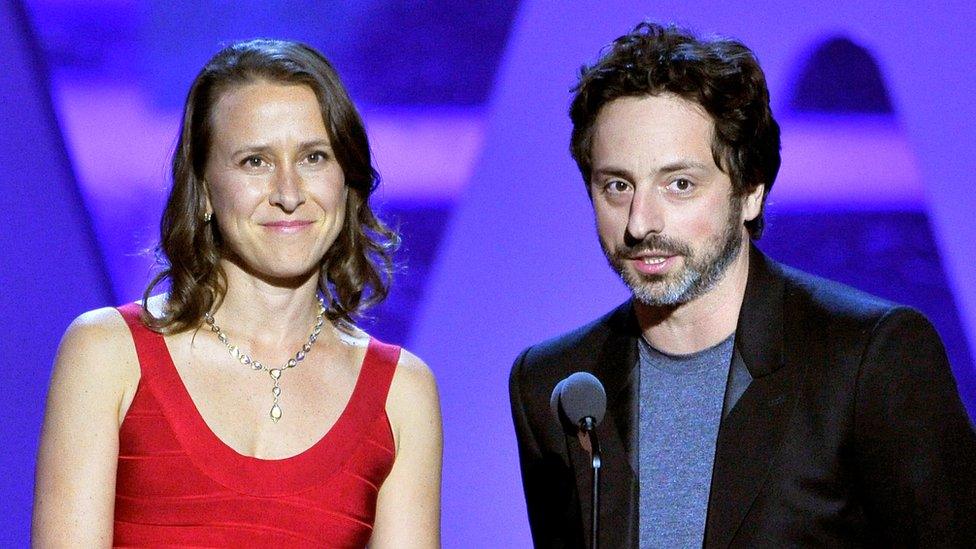
Anne was married to Google co-founder Sergey Brin from 2007 until separating in 2013 and eventually divorcing in 2015
While the disputes with the FDA caused the company difficulties, it did not put off investors.
Exact figures are hard to come by because 23andMe remains a private company, but according to estimates it has now raised just over $790m, giving it the $2.5bn valuation.
An early investor was internet giant Google, which invested $3.9m in 2007, external. At the time Google co-founder Sergey Brin was married to Anne. They divorced in 2015.
More than five million people across more than 50 countries are now said to have bought and used a 23andMe home data test.
In addition to telling users about any potential genetic health risks, it aims to use the DNA data it collects - stripped of identifiers so as to keep everything anonymous - to help create new drugs and treatments.
To help achieve this goal, the company signed a four-year research and collaboration agreement this July with UK drugs giant GlaxoSmithKline., external
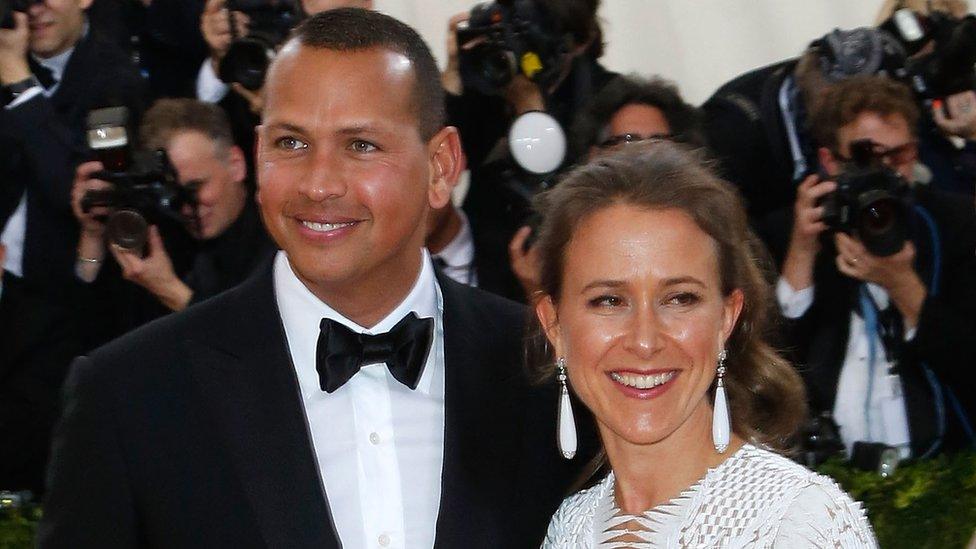
Anne made tabloid headlines in 2016 when she dated US baseball star Alex Rodriguez
Anne says that while the tests cannot perform miracles - she jokes that "you won't know the day you are going to die" - they can "tell us about risk factors".
She adds: "Our life expectancy is this beautiful interplay of what we're born with, and how we live. Our environment plays a major role in our health."
Bradley Malin, professor of biomedical informatics at Vanderbilt University in Nashville, Tennessee, says that companies like 23andMe are now increasingly being taken more seriously.
"[Initially] the majority of the services provided focused on learning about one's traits and ancestral heritage," he says.
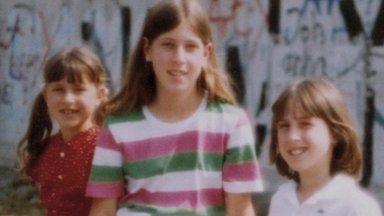
The three sisters were told to follow their dreams
"Over time the focus has increasingly shifted towards kinship discovery and diagnostic services, which is shifting the dynamic, making these companies less of a novelty, and more of a technology that has the potential to be quite disruptive."
On a day-to-day basis Anne says she likes to be a hands-on boss with her 500 employees. "I like knowing not just about the work someone is doing, but about who they are."
She adds that like her two sisters she is continuing to follow her passions. "All three of us really enjoy our work, and feel like we are contributing to the world."